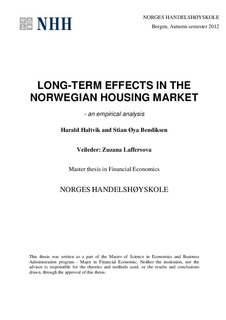Long-term effects in the Norwegian housing market : an empirical analysis
Master thesis
Permanent lenke
http://hdl.handle.net/11250/169401Utgivelsesdato
2012Metadata
Vis full innførselSamlinger
- Master Thesis [4372]
Sammendrag
In this thesis we have analysed the Norwegian housing market. On the basis of our
examination of possible factors affecting the housing market, we have estimated a model to
explain the Norwegian housing prices. Especially, we wanted to test if the state of the
economy, categorized by the different phases in a business cycle, had a significant effect on
the housing prices We have estimated a short-term dynamic and a long-term solution, where
we show the different factors’ affect on housing prices.
We start by presenting the development in the Norwegian economy, and the peculiarities of
the housing market. To create a basic understanding of housing models and previous
research, we present the two main models for housing prices conducted in Norway the last
15 years. We then presented the variables we believed to affect the housing prices and the
statistical methods used. The final model was estimated and tested, and proved to be good at
both explaining and predicting the housing prices in the period from 1986 to 2011.
In our final model, we could not find any significant effects from the different states in the
business cycle. We found that the short-term dynamic in the housing market are affected by
the change in housing prices in earlier periods, and the long-term solution is affected by the
development in households’ real disposable income, housing stock and real interest rate. We
also tested the models ability to predict housing prices. In general the predictions were fairly
decent, which indicates that the variables have a consistent economic grounding throughout
the period. There will although be problems with using the model to predict future housing
prices, since the development in the variables are uncertain and often subject of revising in
retrospect.
